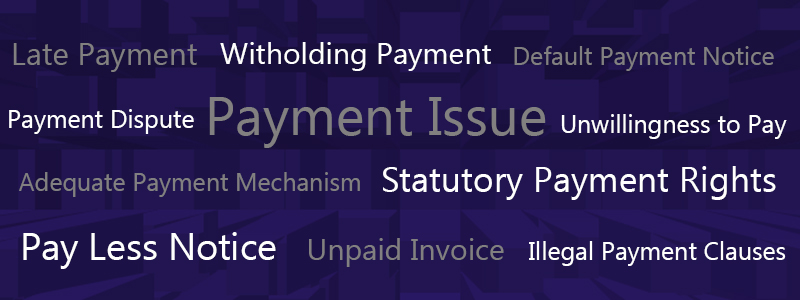Commercial Construction Contracts and Payment Notices
The Housing Grants Construction and Regeneration Act 1996 (HGCR Act 1996) (the Construction Act) and The Local Democracy Economic Development and Construction Act 2009 (LDEDC Act) (The New Construction Act) provide powerful legislation to protect the payee in Construction Contracts.
The paying party (the payer) has a strict obligation imposed on them to get the payment process right. There are no excuses and there is no sympathy if you do not know what to do and subsequently fall foul of the format and issue of the appropriate payment notice. Money can become due as claimed, without a detailed trial over the value of works done.
The Construction Acts cannot be overwritten or excluded by a contract, indeed the contract must comply with the Construction Acts and in the case of payment terms, if a payment clause is "inadequate" or does not comply with the Construction Acts it will be void in part or as a whole.
The Construction Acts give a right to be paid, a right to suspend for non-payment and make pay when paid and or certified on another contract void. However we will deal here only with the Payment Notices aspect. Payment Notices are an inescapable formality in simple terms without referring to the complexity of the Construction Act, you need to understand....
WHAT a Payment Notice is, there are THREE types...
- Payment Notice (Payer)
- Pay Less Notice (Payer)
- Default Payment Notice (Payee)
All three types must unambiguously contain and;
- State the Sum Due
- Provide the Basis for Calculation of the Sum Due
Payment Notice
A Payment Notice is a mandatory obligation on the payer to value the work done and to certify the payment due.
If served too late to be a Payment Notice, it still may be in the correct timescale for a Pay Less Notice. In this case, if issued correctly in all respects apart from time, the Payment Notice can morph into a Pay Less Notice.
It does not matter what form the Payment Notice comes in as long as it states the sum due and the basis for calculation and it is served in time.
The critical point here is that the Payment Due Dates must be clearly identified in the contract otherwise any perfectly manicured Payment Notice can be void if served out of time, due to a misunderstanding in respect of what the Payment Due Date is.
Pay Less Notice
The Pay Less Notice is the last opportunity to revise the earlier Payment Notice or to certify the work done. It is the last opportunity in most cases for the payer to have a say in what the value of the work done is. If an issue arises in the Payment Period the payer cannot revise a certificate or Payment Notice already issued, he simply issues a Pay Less Notice, provided it is served in time.
A Pay Less Notice must be served by the payer within the time period set by the contract prior to the Final Date for Payment. The time period is often set to one day before or as an example seven days before under the scheme. The Pay Less Notice values the work at the date it is issued, but it must be prescribed in the same way to state the sum due (even if zero) and the basis for calculation.
If a Pay Less Notice (or Payment Notice) is validly served and it becomes the notified sum then it can be opened up by an Adjudicator who will value the actual work done and at the date of the Pay Less Notice, thus if more work has been done, it could end as pay more if the reductions alleged fail!
Read our latest Advice Guide on Pay Less Notices
Payment Notices - Summary
There will always be a notified or notifiable sum in any payment period in any commercial construction contract if it is not done by the payer the payee will be able to establish a legally binding value to be paid in default.
Both parties must timely notify the sum due for payment and the basis for calculation in a written notice otherwise it will be void.
If there is no payment terms (e.g. oral contracts) or an inadequate mechanism for payment in the contract, the Scheme kicks in and substitutes the payment terms that are missing or void. Under the Scheme there is a mechanism for payment to establish the Payment Due Date, the Payment Period and Final Date for Payment. The actual legal dates when Payment Notices are served may not have been done correctly if a different and erroneous belief of dates is acted on. Consequently Payment Notices can be void by virtue of being too early or too late.
Timing is everything, Both parties must understand the meaning of "adequate payment mechanism", the terms "Payment Due Date", "Payment Period" and "Final Date for Payment" and be clear on what these dates and values are. Otherwise one of the parties and particularly the payer, may fall foul of a Payment Notice being void and payment being due in default contrary to the belief of the Payer.
Where a Payment Notice or Pay Less Notice is validly served by a payer these can be scrutinised by an Adjudicator.
Where a Default Payment Notice is validly served by a payee this cannot be scrutinised by an Adjudicator and the sum stated as due is set in stone.
In our experience many contractors do not understand the meaning and logistics of Payment Notices and they gain or lose on a random lottery basis! Arbicon can provide certainty to your rights.
If you would like Arbicon to evaluate your Payment Rights, please use our contact form or call one of our offices.

